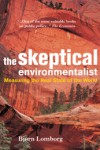FiveBooks asked science writer Matt Ridley for a reading list on Technology, Optimism and How It’s All Going To Be Fine. Read what he had to say to editor Anna Blundy about top 5 pick The Skeptical Environmentalist by the one and only Bjørn Lomborg.
~ ~ ~
 He read a famous article about Julian Simon in Wired, about the bet and Simon’s views, and Bjorn, being a gay, vegetarian, left-wing Dane thought: ‘This is crap.’ But he was an economics professor so he set some of his students to show what was wrong with Simon’s argument but, instead of showing what was wrong they concluded, after a term, that Simon was absolutely right, and Bjorn became a convert to Simon’s view and he started taking on environmental pessimism and wrote The Skeptical Environmentalist. He said, hang on, most of the environmental trends in the world are getting better not worse. There is more forest now than there was 50 years ago.
He read a famous article about Julian Simon in Wired, about the bet and Simon’s views, and Bjorn, being a gay, vegetarian, left-wing Dane thought: ‘This is crap.’ But he was an economics professor so he set some of his students to show what was wrong with Simon’s argument but, instead of showing what was wrong they concluded, after a term, that Simon was absolutely right, and Bjorn became a convert to Simon’s view and he started taking on environmental pessimism and wrote The Skeptical Environmentalist. He said, hang on, most of the environmental trends in the world are getting better not worse. There is more forest now than there was 50 years ago.
No. Really?
Yup. Not in the right places necessarily. Rain forest is retreating but go to the Eastern seaboard of America. It’s covered in forest. It used to be farmland. Some of it’s plantations but some of it’s just wild forest that’s regrowing. The total number of trees in the world is going up at the moment, not down. There’s less water pollution, less air pollution, the kinds of things that caused urban smog in LA in the 1960s are going down dramatically.
With the trees. That sounds so unlikely.
Exactly. A lot of what he says sounds unlikely because, as he says, people have heard the litany over and over again. He went back to reputable sources – UN, World Bank, other sources – and he found that the numbers simply don’t support the pessimism. There aren’t as many trees as there were…well, when?
1510.
Britain probably has more trees now than in 1510. Huge forest clearances had happened long before that. The forestry commission has planted a lot of trees. There’s certainly more forest today than at any point in the last couple of hundred of years. When it got to be this lightly forested, it was probably the Middle Ages. There were huge forest clearances to fuel the iron industry in the 15th, 16th and 17th centuries. And real problems because they started running out of charcoal. The iron industry had to leave the South of England because there were no trees left. They moved to Wales and Cumbria and deforested that too. Species extinction rates for mammals and birds peaked around 1900 and they’ve been dropping since. That’s not in Bjørn’s book but I’ve been looking into it.
OK. Assuming that this is true, it must be then that we love being pessimistic. If this is the evidence right in front of our faces and yet we’re all dooming and glooming around saying it’s the end of the world and our children are all going to drown, then we must love it. Why are we so pessimistic?
Good question and one I don’t have a complete answer to. A lot of it, of course, goes back to the media. Good news is no news. There was a good example the other day. Maternal mortality rates in the world were going down for a long time and then started levelling out because of Aids in the 90s. It’s resumed its decline and global maternal mortality has been falling steeply in the last few years. The Lancet received a paper about this and the editor of The Lancet came under huge pressure from NGOs not to print this paper because those NGOs were negotiating for grant increases to work on maternal mortality and they didn’t want the good news out there. I think they should want the good news out there because it shows that what they’re doing is working.
Yes, but I suppose if everything is great then everyone relaxes and people stop working on it and then it will all get worse.
I thought journalists wanted the truth.
Oh. I have never been under that illusion.
No. Exactly. But Lomborg’s book was hugely controversial and he was attacked viciously, physically in one case. Mark Lynas hit him in the face with a cream pie. So much for free speech. Lomborg was rocking the boat and was a nightmare for the Green movement. Bjorn has since made himself famous in the climate debate with Cool It, saying that we need to press ahead with technology rather than trying to change the world economy. When I read The Skeptical Environmentalist and said it was an important book some people ostracised me even for that. It was so controversial. The Danish Academy of Sciences set up a commission on scientific dishonesty, which condemned Lomborg in a sort of medieval way but then they had to undo that and say: ‘Sorry, we were wrong.’
Latest Comments
Have your say!